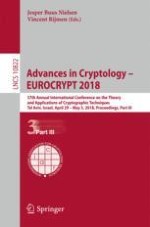2018 | OriginalPaper | Chapter
Exploring the Boundaries of Topology-Hiding Computation
Authors : Marshall Ball, Elette Boyle, Tal Malkin, Tal Moran
Published in: Advances in Cryptology – EUROCRYPT 2018
Publisher: Springer International Publishing
Activate our intelligent search to find suitable subject content or patents.
Select sections of text to find matching patents with Artificial Intelligence. powered by
Select sections of text to find additional relevant content using AI-assisted search. powered by
Abstract
-
We show that even against semi-honest adversaries, topology-hiding broadcast on a small (4-node) graph implies oblivious transfer; in contrast, trivial broadcast protocols exist unconditionally if topology can be revealed.
-
We strengthen the lower bound of Moran et al. identifying and extending a relation between the amount of leakage on the underlying graph topology that must be revealed in the fail-stop setting, as a function of the number of parties and communication round complexity: Any n-party protocol leaking \(\delta \) bits for \(\delta \in (0,1]\) must have \(\varOmega (n/\delta )\) rounds.
-
A THC protocol that leaks at most one bit and requires \(O(n^2)\) rounds.
-
A THC protocol that leaks at most \(\delta \) bits for arbitrarily small non-negligible \(\delta \), and requires \(O(n^3/\delta )\) rounds.
